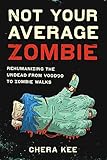Not Your Average Zombie : Rehumanizing the Undead from Voodoo to Zombie Walks / Chera Kee.
Material type: TextPublisher: Austin : University of Texas Press, [2021]Copyright date: ©2017Description: 1 online resource (224 p.)Content type:
TextPublisher: Austin : University of Texas Press, [2021]Copyright date: ©2017Description: 1 online resource (224 p.)Content type: - 9781477313183
- 398.21 23
- GR581 .K44 2017
- online - DeGruyter
| Item type | Current library | Call number | URL | Status | Notes | Barcode | |
|---|---|---|---|---|---|---|---|
 eBook
eBook
|
Biblioteca "Angelicum" Pont. Univ. S.Tommaso d'Aquino Nuvola online | online - DeGruyter (Browse shelf(Opens below)) | Online access | Not for loan (Accesso limitato) | Accesso per gli utenti autorizzati / Access for authorized users | (dgr)9781477313183 |
Browsing Biblioteca "Angelicum" Pont. Univ. S.Tommaso d'Aquino shelves, Shelving location: Nuvola online Close shelf browser (Hides shelf browser)

|

|

|

|

|

|

|
||
| online - DeGruyter Energy : The Life of John J. McKetta Jr. / | online - DeGruyter The Texanist : Fine Advice on Living in Texas / | online - DeGruyter The Quality of Life Report : A Novel / | online - DeGruyter Not Your Average Zombie : Rehumanizing the Undead from Voodoo to Zombie Walks / | online - DeGruyter Where the Land Meets the Sea : Fourteen Millennia of Human History at Huaca Prieta, Peru / | online - DeGruyter The Lean Lands / | online - DeGruyter Comic Book Film Style : Cinema at 24 Panels per Second / |
Frontmatter -- Contents -- Acknowledgments -- Introduction. From the Zombi to the Zombie -- Part I. Zombie Identities -- Chapter 1. From Cannibals to Dead Men Working in the Cane Fields -- Chapter 2. Racialized and Raceless -- Chapter 3. “You Can’t Hurt Me, You Can’t Destroy Me, You Can’t Control Me” -- Chapter 4. A Proud and Powerful Line -- Part II. Playing the Zombie -- Chapter 5. “Be Safe, Have Fun, Eat Brains” -- Chapter 6. I Walked with a Zombie -- Conclusion. “I Think I’m Dead.” -- Notes -- Bibliography -- Index
restricted access online access with authorization star
http://purl.org/coar/access_right/c_16ec
The zombie apocalypse hasn’t happened—yet—but zombies are all over popular culture. From movies and TV shows to video games and zombie walks, the undead stalk through our collective fantasies. What is it about zombies that exerts such a powerful fascination? In Not Your Average Zombie, Chera Kee offers an innovative answer by looking at zombies that don’t conform to the stereotypes of mindless slaves or flesh-eating cannibals. Zombies who think, who speak, and who feel love can be sympathetic and even politically powerful, she asserts. Kee analyzes zombies in popular culture from 1930s depictions of zombies in voodoo rituals to contemporary film and television, comic books, video games, and fan practices such as zombie walks. She discusses how the zombie has embodied our fears of losing the self through slavery and cannibalism and shows how “extra-ordinary” zombies defy that loss of free will by refusing to be dehumanized. By challenging their masters, falling in love, and leading rebellions, “extra-ordinary” zombies become figures of liberation and resistance. Kee also thoroughly investigates how representations of racial and gendered identities in zombie texts offer opportunities for living people to gain agency over their lives. Not Your Average Zombie thus deepens and broadens our understanding of how media producers and consumers take up and use these undead figures to make political interventions in the world of the living.
Mode of access: Internet via World Wide Web.
In English.
Description based on online resource; title from PDF title page (publisher's Web site, viewed 26. Apr 2022)


